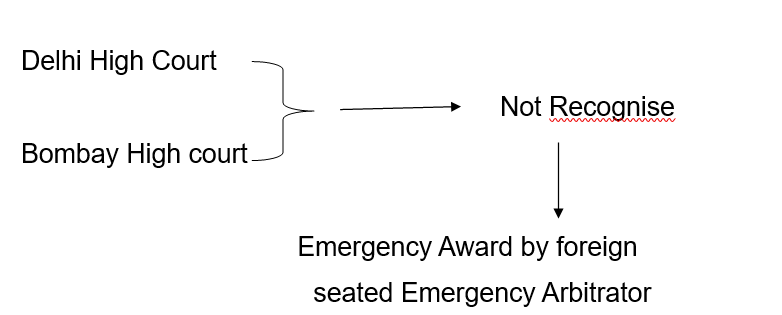Content
| Abstract |
| Emergency Arbitrator: Necessity |
| Introduction of Emergency arbitrator |
| Before Amazon ruling • 20th law commission • High level committee • Approach of Indian court |
| The amazon ruling • Fact • Contention of Biyani group • Supreme court held |
| conclusion |
| Bibliography |
1.Abstract
The Hon’ble supreme court of India in the matter of Amazon.com NV Investment Holding LLC v. Future Retail Ltd[1] has recognised and allowed the an “award” passed by an emergency arbitrator appointed under the arbitration rule of the Singapore International Arbitration center (SIAC).
The ruling assumes massive significance in the larger scheme of strengthening the Indian legal ecosystem and framework for International commercial arbitrations. Further, this could be one of the pioneering decision granting recognition to the emergency arbitrators, which may also prove to me by pivotal for parties considering to be govern by Indian law as a the crucial law of a arbitration.
This blog going to look towards the emergency arbitration and law related to it.
2. Emergency Arbitration: Necessity
Historically, parties to international arbitration on agreement had no recourse to arbitration to preserve the status quo, conserve assets, prevent tampering with evidence or seek other provisional reliefs until an arbitral tribunal was validly constituted.[2] thus for seeking urgent interim or provisional reliefs before the constitution of an arbitral tribunal, The parties had to necessarily approach the National courts, which is inherent downsides of loss of confidentiality, delay and dependence on the local procedure. The option is to await for constitution of arbitral tribunal
and therefore, to reduce the involvement of national courts in the arbitral process. International arbitral institution in modern jurisdiction introduced an arbitrary arbitrator to whom the party could apply for emergency interim relief prior to the constitution of an arbitral tribunal.
3. Introduction of Emergency Arbitrator
International Center for Dispute Resolution (ICDR) introduced the concept of an emergency arbitrator thereafter, most notable arbitral institution around the world, such as International Chamber of Commerce(ICC), the London Court of International Advertisations (LCIA), Singapore International Advertising Center (SIAC) and other has introduced that concept of emergency arbitration.
In India, the rules of arbitral institutions such as Mumbai Center for International Arbitration (MICA) and Delhi International Arbitration Center (DIAC) provide for the appointment of an emergency arbitrator to deal with emergency Arbitrator to deal with emergency situations requiring urgent interim relief.
Emergence of emergency arbitration is the recent phenomena. It is getting importance because of its ability to provide immediate and efficient interim relief to parties.
4 Before Amazon Ruling
20th Law commission of India (2012) was entrusted with the task of reviewing the provisions of the Arbitration Act. It made recommendation to encourage the culture of Institutional Arbitration in India and to redress institutional and systematic malaise that had seriously affected the growth of Arbitration in the country.
Law commission suggested broadening the definition of ‘arbitral tribunal’ under section. 2(1)(d) of the Arbitration Act to include “emergency Arbitrator”
However, defination to include emergency arbitrator was not included. But 2015 amendment largely incorporated the suggestion of Law commission.
In 2016 High level committee to review Institutionalisation of Arbitration mechanism in India was set up by Government of India the committee also advised the adoption of recommendation made by law commission to give statutory recognition to Emergency arbitrator under the arbitration act.
However, once again chooses to ignore the recommendation in 2019 amendment. No provision of emergency abitrator was added.
Approach of Indian courts
Raffles design International India (P) Ltd v. Educomp professional Education Ltd [3] —
The petitioner, after having secured interim order from the ted under the Emergency Arbitrator constituted under SIAC[4] rules in foreign Seated arbitration had approached the Hon’ble Delhi High court for grant of interim relief under section 9 of the Arbitration Act.
The Delhi High court opined that Such Interim Awards/order cannot be enforced in India, court can independently apply its mind and grant interim relief under section 9 of the Act.
Similarly, the Bombay High court, in the Avitel post studioz Ltd. v. HSBC PI Holding (mouritius) Ltd [5], the court decide interim relief under section 9 of the Act, despite the fact that the interim relief was passed already by Emergency arbitrator under SIAC rules.

In Ashwani minda v. U-shin Ltd[6] the emergency Arbitrator appointed in a foreign seated arbitration governed by Japan commercial Arbitration Association Rules (JCAA) had declined to grant interim relief to the Applicant (Ashwani minda) then approached Delhi High Court under section 9 and prayed for similar relief. The court held after having unsuccessful attempt to obtain interim relief from emergency arbitrator. They cannot have second attempt under section 9 interim relief by the court. The Hon’ble court impliedly affirmed the competency of an emergency arbitrator to grant interim relief.
In the absence of enabling provisions, allowing enforcement of interim order in a foreign seated arbitration, the parties has to go to the route of section 9 of the act to seek exact and same relief.

5. The Amazon Ruling
Fact- The Investment made by Amazon.com NV Investment holding LLC (Amazon) in Future coupon Pvt Ltd (FCPL) and indirecty in Future retail Ltd (FRL), whereunder certain rights were to retail given to FCPL, in relation to assets of FRL. The rights granted in favor of FCPL were to be exercised for benefit of Amazon Such that FRL could not have transferred It’s retail assets without FCPL’s consent, which in turn could not be granted unless Amazon had given its consent.
Some action of Biyani group to sell its retail stake to reliance was challenge by Amazon. Amazon initiated arbitration proceeding under the SIAC rules against the Biyani group seeking emergency interim relief. The seat of arbitration was New Delhi. The emergency arbitrator passed an “interim award” dated 25 October 2020 rely. Interalia granting certain injunction/ direction against Biyani Group. Biyani Group does not consider the award under section 17(2) Amazon file application for enforcement before Delhi High court. Single judge bench of Delhi High Court held that the emergency arbitrator’s interim award was an order under section 17(1) of the arbitration act and was accordingly enforceable under section 17(2) of the act.
On appeal the division bench stayed the judgment of single judge bench. being aggrieved by the order of division bench, Amazon challenge the same before the Supreme Court.
In supreme court
Two significant question before supreme court was: –
-
- Weather an “award” delivered by an emergency arbitrator under the SIAC rules can be said to an order under section 17(1) of the arbitration act?
-
- Whether an order passed under section 17(2) of the arbitration act in the enforcement of the award of an emergency arbitrator by a single judge of the High Court is appealable?
Contention of Biyani group
1. Section 17(1) mention about interim measure by arbitral tribunal. Section 17(1) — during arbitral proceeding.
—-Emergency arbitrator is not arbitrator tribunal.
—-During arbitral proceeding, apply to the arbitral tribunal for interim relief does not come under arbitral proceeding as it is the before constitution of arbitral tribunal.
2. Biyani group emphasized on the definition of “arbitral tribunal” under section 2(1)(d) of the act.
3. Biyani group argued that, despite the recommendation of law commission, the Parliament in its wisdom decided not to grant a statutory recognition to the concept of emergency arbitrator.
- Supreme Court, while rejecting the contention of Biyani Group, give following reasons: –
supreme court held
-
- The Hon’ble court, while referring to section 21[7] of the act and rule 3.3 of the SIAC rules, held that the arbitral proceeding under SIAC rules can be said to have commenced from the date of receipt of a complete notice of arbitration by the registrar of SIAC.
-
- Thus section 17(1) uses the expression “during the arbitral proceeding” The said provision include emergency arbitrator proceeding, which commence only after the receipt of notice of arbitration by the registrar under rule 3.3 of the SIAC rules.
-
- The Hon’ble court, while referring to section 21[7] of the act and rule 3.3 of the SIAC rules, held that the arbitral proceeding under SIAC rules can be said to have commenced from the date of receipt of a complete notice of arbitration by the registrar of SIAC.
-
- The second contention of Biyani group negated by referring to the words “unless the context otherwise required”, the court while relying on section 2(1)(d) section 2(6) and section 2(8) of the arbitration act, held that the context of section 17(1) of arbitration act is unique and it is “otherwise required” the definition of to include emergency arbitrator when Institutional rules apply.
-
- To discredit third argument, the Hon’ble court relied on the judgment of Avitel post studioz Ltd. v. HSBC PI Holding (mouritius) Ltd [8] The court held that mere fact that the recommendation of a law commission report is not followed by the Parliament would not necessarily lead to the conclusion that the suggestion of Law Commission cannot for part of the statute. It was possible to interpret section 17(2) of their arbitration act to enforce the emergency award for arbitration seated in india.
6. conclusion
After Amazon case it became clear that party autonomy, party autonomy to choose Institutional arbitration is upheld by the Hon’ble supreme court. In doing so the position Emergency arbitrator is established for India seated arbitration. Its award has binding effect and it can be enforced under Section 17(2) of Arbitration Act.
Thank you
Priynandan
Written by priynandan
Associate at
corpus juris and associates
published on
on
date 23/03/2024
Bibliography
1. Arbitration and conciliation Act, 1996.
2. class room notes by Rajnish sing sir Prof. Faculty of law, BHU
3. Emergency Arbitrator proceeding (Binding but not final): A Note on issue of enforcement. – Rajnish kumar singh.
4. Recognition and enforcement of emergeny. Arbitration in India: A comment on the supreme court’s Ruling in Amazon- future dispute by Ranjit Shetty and Rahul dev (4 JALR (2022)75)
Note: this content is reproduced what I had submitted as assignment of ADR during my 4th semester.
[1] (2022) 1 SCC 209, 2021SCC Online SC 557
[2] Grant Hanessian & E. Alexandra bosman songs of Innocence and experience: Ten years of Emergency.arbitration (2018)
[3] 2016 SCC Online Del 5521
[4] Singapore International Arbitration Center
[5] 2014 SCC Online Bom 929
[6] 2020 Scc Online Del 1645
[7] Secion 21 commencement of Arbitral proceeding (under Arbitration and concilliation Act, 1994)
[8] 2014 SCC Online Bom 929
Lorem ipsum dolor sit amet, consectetur adipiscing elit. Ut elit tellus, luctus nec ullamcorper mattis, pulvinar dapibus leo.


